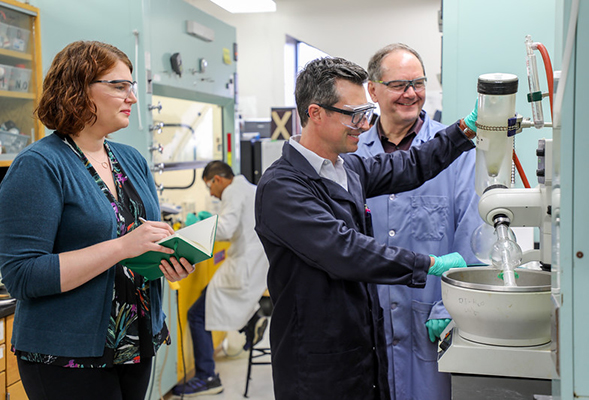$5 Million STEM Grant Fosters Future Chemists
The NSF funding will help Southwestern College transfer students gain lab and research exposure at SDSU.

These are some of the many concerns a new $5 million National Science Foundation (NSF) S-STEM grant (Scholarships in Science, Technology, Engineering and Mathematics) will help address. The grant will create research opportunities at San Diego State University for promising students from Southwestern College interested in careers in chemistry.
The transfer students will be mentored, given lab exposure and research opportunities, and receive scholarships to help with tuition and other needs.
Conceived by three SDSU chemistry professors and their counterparts from Southwestern College, the joint grant will help identify students at the community college, pair them with graduate student mentors at SDSU, and give them the chance to experience hands-on research in wet labs focused on pioneering chemistry research.
SDSU will receive $1.7 million to support the students and create opportunities for them to explore chemistry pathways. The project will be led by Regis Komperda whose research focus is improving chemistry education, in close collaboration with Byron Purse and Mikael Bergdahl. The idea first came up after discussions with Southwestern College chemistry professor David Hecht.
Hecht is deeply involved in preparing Southwestern’s students for careers in science and transferring to four-year universities. One of the challenges he faced was that many of the community college’s students didn’t get into SDSU as transfer students – but had strong ties to the area and had difficulty going elsewhere to study.
“We looked for ways to make transfers easier, using research as a bridging experience to help them successfully transfer to SDSU and onto science careers,” Purse said. “We’ve had a long-standing interest in recruiting strong entrants in both our undergraduate and graduate programs, especially students from underrepresented backgrounds who often don’t think of applying or don’t get in.”
The admissions issue is twofold: SDSU receives a large volume of applications and many of these students don’t receive guidance to represent themselves as strong candidates.
While the need for mentoring promising students facing barriers to pursuing chemistry pathways was clear, the professors were missing a core component that came together when Komperda joined SDSU.
Purse and Bergdahl are experts in their fields – Purse’s research focuses on filling a gap in theoretical chemistry by designing and synthesizing molecules that can better help us understand genetic code, while Bergdahl’s lab focuses on finding molecules to treat major diseases like cancer and hepatitis C - but they needed someone with expertise in assessing the outcomes of educational interventions, understanding how to create the metrics, and what challenges might arise. By serendipity, Komperda joined the chemistry department as a SFES (science faculty with education specialty) this year, bringing strengths in the exact areas needed.
“We will provide support to help the students choose paths that are the right fit for them, and also to not feel like outsiders but be an essential part of a research group,” Komperda said. The grant will help assess whether the interventions help them stay in the chemistry program, graduate with less debt, help improve grades, and then go on to graduate school and STEM careers.
The guidance the students will receive from mentors will be a key part of the program’s success.
“Undergraduates need to have a lab mentor and be supervised,” Bergdahl said. “The more they grow in the lab, the more independent they will be later, a natural evolution of being a scientist.”
Recruitment to be part of the project has already begun at Southwestern, and the first transfer students are expected to arrive at SDSU in fall 2021. But while they’re still at Southwestern they will begin working in SDSU labs from summer 2020, and be paired with graduate student mentors who will also receive training and support. The grant will be spread over five years and support 120 scholarships.
The mentoring will follow the model of MINDSET (Maximizing Inclusion and Diversity in Science, Engineering, and Technology), a mentoring program established by another chemistry professor, Christal Sohl, in conjunction with faculty at Miramar College, to promote diversity in STEM.



